Shijie Sheng
Address
Karmanos Cancer Institute, 4100 John R, Detroit, MI 48201Office Address
Karmanos Cancer Institute
4100 John R, Room 640.2
Detroit, MI 48201
Department
Pathology and Oncology
Research Interests
• Endogenous histone deacetylase inhibition by maspin in cancer stem cell biology
• The molecular mechanisms underlying tumor cell phenotypic plasticity in tumor progression, metastasis and tumor response to host immune surveillance or drug treatment.
• Models of tumor and the microenvironments, with 3D culture, tumor xenografts and genetically modified mice
• Molecular markers for tumor progression and metastasis
Research Description
Dr. Sheng’s research focus is on tumor cell phenotypic plasticity in response to (i) changes of tumor microenvironments in the continuum of tumor metastasis and (2) cancer therapies. Dr. Sheng was one of the co-discovers of the maspin gene also known as SERPIN B5. Dr. Sheng’s team approaches its research aspiration with innovative methodologies of biochemistry, molecular biology, cell biology, and animal models. The research in the Sheng Laboratory has also been supported by a multidisciplinary team of collaborators to explore the potential clinical translation in the areas of cancer diagnosis and prognosis. The noteworthy breakthrough discoveries made by Dr. Sheng and colleagues include: (i) global maspin gene knockout leads to mouse embryonic lethality; (ii) maspin protein is expressed as a nuclear protein in terminally differentiated epithelial cells. (iii) tissue-specific maspin deficiency leads to carcinogenesis and inflammation in mouse epithelial tissues; (iv) the loss of maspin mRNA expression is detected in high grade tumors in the breast, prostate, lung, oral cavity, and esophageal-gastrointestinal/esophageal junction, but the accumulation of cytoplasmic maspin seems to correlate with a worse cancer prognosis. (v) the translocation of maspin from the nucleus to the cytoplasm seems to sustain cancer stem cells in a primed state which is under a high level of proteostatic stress. (vi) The Maspin protein acts as a serine protease inhibitor-like protein to inhibit the enzymatic activities of histone deacetylase 1 (HDAC1), which may also inactivate the ER stress-associated chaperone GRP78 in the cytoplasm. To date, maspin is the only endogenous polypeptide HDAC inhibitor identified thus far.
Selected Publications
S Sheng, MM Bernardo, SH Dzinic, K Chen, WA Sakr, The vulnerable primed cancer stem cells in disguise: demystifying the role of maspin. Cancer Metastasis Reviews. 2022;41:965-74.
S Sheng, MM Bernardo, SH Dzinic, K Chen, EI Heath, WA Sakr, Tackling tumor heterogeneity and phenotypic plasticity in cancer precision medicine: our experience and a literature review. Cancer Metastasis Review. 2018;37:655-63.
SH Dzinic, MM Bernardo, X Li, R Fernandez-Valdivia, YS Ho, QS Mi, S Bandyopadhyay, FLonardo, S Vranic, DS Oliveira, RD Bonfil, G Dyson, K Chen, A Omerovic, X Sheng, X Han, D Wu, X Bi, D Cabaravdic, U Jakupovic, M Wahba, A Pang, D Harajli, WA Sakr, S Sheng, An Essential Role of Maspin in Embryogenesis and Tumor Suppression. Cancer Res. 2017;77:886-96.
MM Bernardo, A Kaplun, SH Dzinic, X Li, J Irish, A Mujagic, B Jakupovic, JB Back, E Van Buren, X Han, I Dean, YQ Chen, EI Heath, W Sakr, S Sheng, Maspin Expression in Prostate Tumor Cells Averts Stemness and Stratify Drug Sensitivity. Cancer Res. 2015;75:3970-9.
Education/Training
BS (1986): Beijing University, Beijing, China
PhD (1993): University of Florida College of Medicine, Gainesville, Florida
Post-Doc (1997): Dana-Farber Cancer Institute of Harvard Medical School, Boston, Massachusetts
Courses Taught
CB7220 Molecular Biology of Cancer Development
CB7240 Cancer Therapy
CB7460 Cancer Signaling
CB7700 Cancer Biology Program Graduate Student Journal Club
